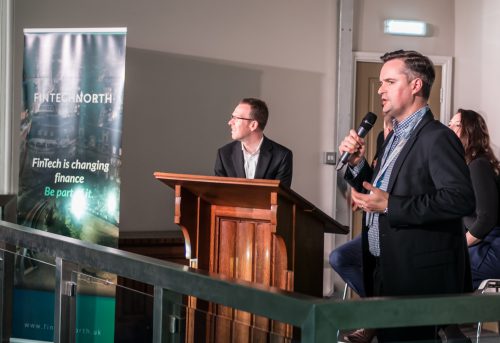The start of a chain reaction

Blockchain has become the latest buzzword – heralded as the spark that will ignite a revolution in the way we live our lives.
Sectors ranging from banking to education and health are set to be transformed by the open-source ledger behind crypto-currencies such as bitcoin, according to the headlines.
Blockchain delivers a way of making and recording transactions, agreements and contracts that is both secure and public.
The financial services sector is certainly interested in its possible applications. The industry spent an estimated £1.3bn on blockchain technologies in 2017, according to research by market intelligence company Greewich Associates.
And banks and other companies are now moving beyond the proof-of-concept stage, according to its study.
Despite that report Julian Wells, co-founder of FinTech North, says: “Blockchain is still very much in the early stages when it comes to its application.
“There is a lot of interest and excitement. The questions that are being asked by organisations are ‘how do we use it? What problems are there that it may be able to solve?’”
Sheffield-based big data specialist WANdisco is at the cutting edge of work to resolve some of the issues associated with blockchain technology.
The company says public blockchains “have a number of significant limitations, which include resource intensiveness required to maintain their integrity”.
For blockchains to become commercially viable those “restraints” need to be overcome, it says.
WANdisco has now filed a patent to protect the technology it has developed in this field – a move said to give a glimpse of blockchain’s commercial future.
The company says its development opens up the potential of blockchain technology to a broad set of commercial applications including banking, healthcare, retail, pharmaceutical, insurance, and government.
David Richards, WANdisco chief executive, says: “Blockchain will change the way that the financial system works.
“It removes the need for a central clearing house in the traditional sense. It enables the move away from centralisation.
“That’s how financial transactions will work in the future. They are exciting times and we are at the very heart of it.”
A FinTech North seminar this summer, held with Squire Patton Boggs, also examined the future potential of blockchain.
Stefan Haase, director of Whitecap Consulting, told those attending: “You couldn’t pick a sector where there aren’t blockchain developments already being developed. It’s everywhere.”
He then discussed the fundamental characteristics of blockchain, explaining how these characteristics could impact different sectors – key themes he raised were: efficiency, security and transparency.
Haase added: “The end user values frictionless transactions. And blockchain has the ability to deliver that.”
Martin Worner, chief technical officer of blockchain company Alpha Innovations, told the gathering: “It’s only by actually attempting to apply blockchain to new markets that we can look to see what’s possible.”
Sarat Pediredla of global tech consultancy hedgehog lab believes blockchain in the banking sector holds key opportunities to deliver when it comes to both regulatory technology and payments.
The insurance sector is also starting to adopt blockchain solutions, with platforms that can deliver risk management and digital insurance.
However Pediredla said: “The blockchain is only as good as the data you put into it. So, one of the most important challenges in blockchain is not a tech problem, it’s a social-political problem based in human behaviour.
“If someone submits information on a blockchain saying their coffee beans are fairtrade, the blockchain can only record that, not verify it.”









